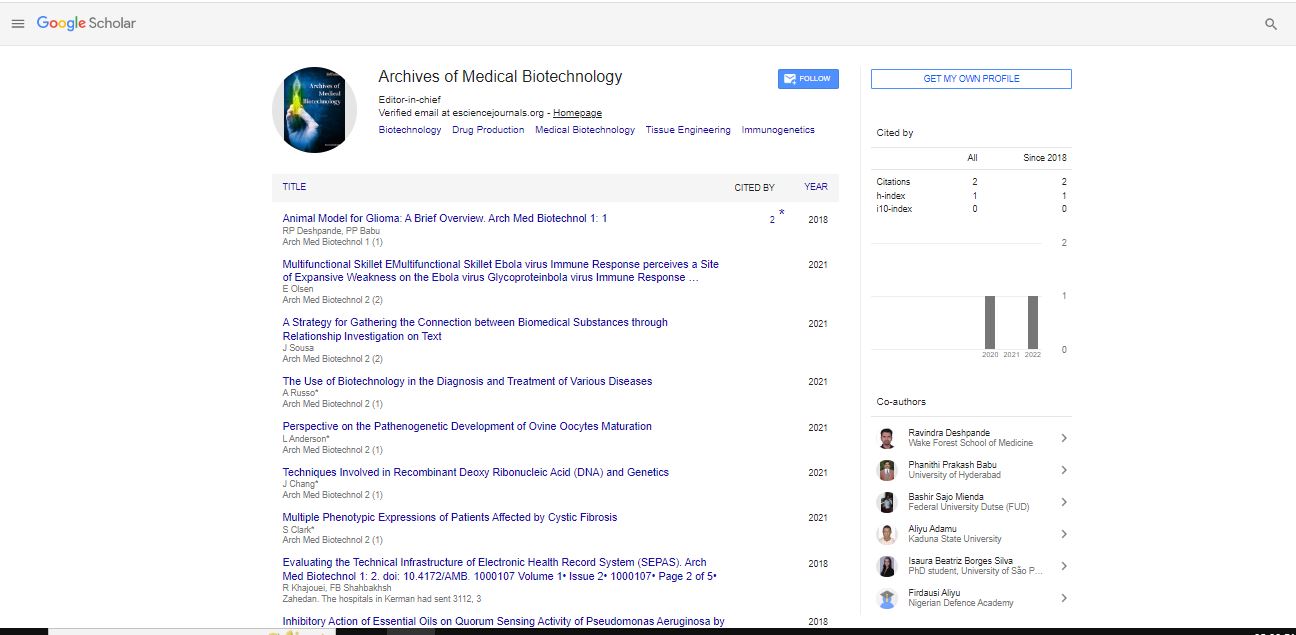Opinion Article, Arch Med Biotechnol Vol: 2 Issue: 1
The Use of Biotechnology in the Diagnosis and Treatment of Various Diseases
Aldene Russo*
Department of Medical Genetics and Genomics, Zhejiang Children's Hospital, Zhejiang University School of Medicine, Hangzhou, Zhejiang 310058, China
*Corresponding Author: Aldene Russo
Department of Medical Genetics and Genomics, Zhejiang Children's Hospital, Zhejiang University School of Medicine, Hangzhou, Zhejiang 310058, China
E-mail: Russo@Aldene.cn
Received: September 06, 2021 Accepted: September 20, 2021 Published: September 27, 2021
Citation: Russo A (2021) The Use of Biotechnology in the Diagnosis and Treatment of Various Diseases. Arch Med Biotechnol 2:1.
Keywords: Biotechnology, Sickness
Introduction
Biotechnology instruments and methods open new exploration roads for finding how solid bodies work and what turns out badly when issues emerge. Knowing the sub-atomic premise of wellbeing and sickness prompts further developed strategies for treating and forestalling infections. In human medical services, biotechnology items incorporate faster and more precise analytic tests, treatments with less incidental effects and new and more secure immunizations.
Diagnostics
We would now be able to recognize numerous infections and ailments all the more rapidly and with more prominent exactness as a result of new, biotechnology-based demonstrative devices. A recognizable illustration of these advantages is the new age of home pregnancy tests that give more precise outcomes a whole lot sooner than past tests. Tests for strep throat and numerous other irresistible sicknesses give brings about minutes, empowering therapy to start quickly, as opposed to the multi-day postponement of past tests. A natural illustration of biotechnology's advantages is the new age of home pregnancy tests that give more precise outcomes a whole lot sooner than past tests. Biotechnology additionally has made an influx of new hereditary tests. Today there are just about 1,000 such tests, as per genetests. A considerable lot of those tests are intended for hereditary infections, while others test inclination to sickness. Arising applications incorporate tests to foresee reaction to medications and help with wholesome arranging [1].
Biotechnology has brought down the expenses of diagnostics much of the time. A blood test created through biotechnology estimates low-thickness lipoprotein ("awful" cholesterol) in one test, without fasting. We presently use biotechnology-based tests to analyze certain diseases, like prostate and ovarian malignant growth, by taking a blood test, wiping out the requirement for obtrusive and expensive medical procedure. Notwithstanding diagnostics that are less expensive, more precise and speedier than past tests, biotechnology is permitting us to analyze sicknesses prior in the infection cycle, which extraordinarily works on a patient's guess.
Proteomics analysts are finding atomic markers that show nascent sicknesses before noticeable cell changes or infection manifestations show up. Before long doctors will approach tests for distinguishing these biomarkers before the illness starts [2]. The abundance of genomics data now accessible will significantly help specialists in early conclusion of genetic sicknesses, for example, type I diabetes, cystic fibrosis, beginning stage Alzheimer's Disease, and Parkinson's Disease-infirmities that beforehand were perceivable solely after clinical indications showed up. Hereditary tests will likewise recognize patients with an inclination to sicknesses, like different malignant growths, osteoporosis, emphysema, type II diabetes and asthma, offering patients a chance to forestall the infection by keeping away from triggers like eating routine, smoking and other natural variables. Biotechnology-based demonstrative tests are changing sickness finding as well as further developing the manner in which medical care is given. Many tests are convenient, so doctors direct the tests, decipher results and settle on treatment in a real sense at the patient's bedside [3]. Also, on the grounds that a considerable lot of these symptomatic tests depend on shading changes like a home pregnancy test, the outcomes can be deciphered without actually prepared staff, costly lab gear or expensive offices, making them more accessible to more unfortunate networks and individuals in agricultural nations.
Biotechnology will make conceivable further developed renditions of the present remedial systems just as inventive medicines that would not be conceivable without these new procedures. Biotechnology therapeutics supported by the U.S. Food and Drug Administration (FDA) to date are utilized to treat numerous sicknesses, including leukemia and different malignancies, paleness, cystic fibrosis, development inadequacy, rheumatoid joint pain, hemophilia, hepatitis, genital moles, and relocate dismissal [4]. The treatments talked about underneath share a typical establishment. All utilize organic substances and cycles planned naturally. Some utilization the human body's own apparatuses for battling contaminations and adjusting issues. Others are regular results of plants and creatures. The enormous scope fabricating measures for delivering helpful organic substances additionally depend on nature's sub-atomic creation systems [5].
References
- Nishi A, Milner DA, Giovannucci EL (2016) Integration of molecular pathology, epidemiology and social science for global precision medicine. Expert Rev Mol Diagn 16: 11-23.
- Dwivedi S, Shukla KK, Gupta G, Sharma P (2013) Non-invasive biomarker in prostate carcinoma: a novel approach. Ind J Clin Biochem 28: 107-109.
- Larrick JW, Fry KE (1991) Recombinant antibodies. Hum Antibodies Hybridomas 2: 172-189.
- Lee WT, Vitetta ES (1991) Virgin T cells do not provide help for antigenspecific B cells in the absence of IL-4, IL-5, and IL-6. Int Immunol 3: 907-916.
- Morens DM, Folkers GK, Fauci AS (2004) The challenge of emerging and reemerging infectious diseases. Nature 430: 242-249.
 Spanish
Spanish  Chinese
Chinese  Russian
Russian  German
German  French
French  Japanese
Japanese  Portuguese
Portuguese  Hindi
Hindi 